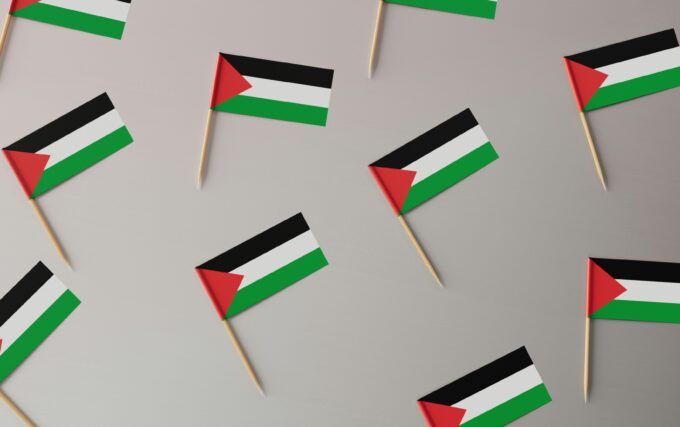
Image by Planet Volumes.
As the Israeli onslaught continues in Gaza, so does the ongoing takeover of the West Bank by Israeli settlers and their military muscle. Armed men and women move onto land that was never theirs and take it by force from the people living there. The Israeli Occupation Forces (IOF—whose official moniker IDF pretends they are defensive in nature) arrest dozens of Palestinians every week in the West Bank because they object to the theft of their land and the massacre of their fellows in Gaza. Those arrests are accompanied by a smaller number of murders by the same military forces. In one sense, their activity is unremarkable: that sense being that it has gone on for so long nobody but those who live in the West Bank rarely even think about it. At least that’s how it seems. In fact, it has been the case ever since the IOF was formed by certain members of the Zionist settler gangs after their campaign to create Israel on Palestinian land succeeded in 1947.
As the world watches Israel’s military massacre thousands of civilians in Gaza there is a growing tendency among the ruling classes of those governments that arm Israel that pretends this war on Gaza is an anomaly. This tendency pretends that the violent erasure of the Palestinians is related to the current regime under Netanyahu. In fact, as a new book titled Deluge: Gaza and Israel from Crisis to Cataclysm makes perfectly clear, the current catastrophe in Gaza is one more step in Israel’s greater goal of a Zionist nation that runs from the Jordan River to the Mediterranean Sea.
The book is a collection of essays edited by Jamie Stern-Weiner, the author of three books, including the 2018 publication Moment of Truth: Tackling Israel-Palestine’s Toughest Questions. A few of the essayists included in the collection are journalists Ahmed Alnaouq of We Are Not Numbers and Mouin Rabbani (Jadaliyya), academics Sara Roy from Harvard’s Center for Middle Eastern Studies and Khaled Hroub from Northwestern University’s Qatar campus, activists from various human rights organizations and Irish Member of European Parliament (MEP) Clare Daly. These writers, together with those not named here, look at the history and some of the potential futures for the Palestinians through the lens forged in the wake of the October 7, 2023 attacks by the Hamas-led resistance.
Although the book was finalized in late December 2023, the selections are of a nature that the only inaccuracies are in the number of casualties. Indeed, as anyone who has followed the events knows, the numbers of Palestinian deaths, injuries, arrests and so on has continued to climb. It seems like each day the death count increases by at least one hundred people. No combination of words can truly express the death, desolation and despair faced by the people of Gaza during this slaughter. Yet, the aforementioned journalist Ahmed Alnaouq comes closer than most others in his piece titled “Just Like That: Life and Death in Gaza” wherein he describes the massacre of his brother and six of his friends in 2014, only to be followed by the murder of the rest of his family only a few months ago. The perpetrators in both mass murders were the Israeli Occupation Forces. Alnaouq’s piece is the only piece in the text that is directed directly at the reader’s emotions.
The other pieces appeal to one’s intellect and sense of justice. They discuss the viciousness of Israel’s actions and the visceral nature of the hate it feels for Gaza. The selection written by Jadaliyya’s Rabbani takes a nuanced look at the role played by regional factors in Hamas’ decision to attack Israel on October 7. In that essay, Rabbani examines the claim by many western journalists that the Trump-era Abraham Accords (and Biden’s acceptance of them) were fundamental to Hamas’ decision. Then, she dismantles those claims, while simultaneously reproaching the all-too-familiar non-action by reactionary Arab governments to Israel’s escalation and the even more reprehensible considerations by some of those governments to assist in Gaza’s ethnic cleansing.
There are glimmers of hope to be found in these pages. The massive protests around the world against Israel’s genocidal onslaught and for the liberation of Palestine are perhaps the brightest of those glimmers. Never before in the history of the Palestinian struggle against the occupation has the world seen such large and often militant protests, especially in the global north. Especially in the two countries other than Israel most responsible for the maintenance and expansion of the occupation—the United States and Great Britain. Speaking to the solidarity these protests represent, Irish MEP Clare Daly’s piece lambasting the actions of the president of the European Union Ursula von der Leyen in support of Israel’s actions writes the following: “The mask of liberal respectability is dropping and the barbarism of old Europe is coming back into the open. Israel has been given a role in the vanguard of a wider assault on the norms and standards that have existed since the Second World War. The rules of a much more deeply unfair and violent world are being written…. That is why the emergence of mass consciousness from these events is so important. Palestine is our future. Its people are ours. We have to fight for them.” (247)
The essays in this book express the urgency and veracity of Daly’s words.
No comments:
Post a Comment